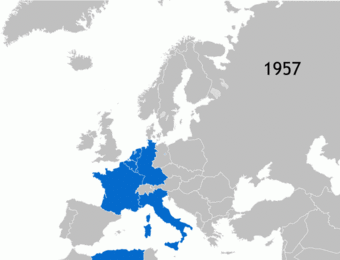Police and Judicial Co-operation in Criminal Matters

 |
Part of a series on the |
||||||||||||||||||||||||
|---|---|---|---|---|---|---|---|---|---|---|---|---|---|---|---|---|---|---|---|---|---|---|---|---|
| History of the European Union |
||||||||||||||||||||||||
 | ||||||||||||||||||||||||
|
Organisation
|
||||||||||||||||||||||||
|
||||||||||||||||||||||||
|
| ||||||||||||||||||||||||
Police and Judicial Co-operation in Criminal Matters (PJCC) was the third of the three pillars of the European Union (EU). It was named Justice and Home Affairs (JHA) before 2003. The pillar existed between 1993 and 2009, when it was absorbed into a consolidated European Union structure and became the area of freedom, security and justice.
The pillar focused on co-operation in law enforcement and combating racism. It was based more around intergovernmental cooperation than the other pillars meaning there was little input from the European Commission, European Parliament and the Court of Justice.[1] It was responsible for policies including the European Arrest Warrant.
History
It was created, on the foundations of the TREVI cooperation, as the Justice and Home Affairs pillar by the Maastricht treaty in order to advance cooperation in criminal and justice fields without member states sacrificing a great deal of sovereignty. Decisions were taken by consensus rather than majority (which was the case in the European Community areas) and the supranational institutions had little input.
The Treaty of Amsterdam transferred the areas of illegal immigration, visas, asylum, and judicial co-operation in civil matters to the integrated European Community. The term Justice and Home Affairs later covers these integrated fields as well as the intergovernmental third pillar. The pillar was renamed "Police and Judicial Co-operation in Criminal Matters" to reflect its reduced scope.
Before the Maastricht Treaty, member states cooperated at the intergovernmental level in various sectors relating to free movement and personal security ("group of co-ordinators", CELAD, TREVI) as well as in customs co-operation (GAM) and judicial policy. With Maastricht, Justice and Home Affairs co-operation aimed at reinforcing actions taken by member states while allowing a more coherent approach of these actions, by offering new tools for coordinating actions.
The Treaty of Lisbon, which entered into force in December 2009, abolished the entire pillar system. The PJC areas and those transferred from JHA to the Community were once more grouped together in creating an area of freedom, security and justice.
| Signed In force Document |
1948 1948 Brussels Treaty |
1951 1952 Paris Treaty |
1954 1955 Modified Brussels Treaty |
1957 1958 Rome Treaty |
1965 1967 Merger Treaty |
1975 N/A European Council conclusion |
1985 1995 Schengen Treaty |
1986 1987 Single European Act |
1992 1993 Maastricht Treaty |
1997 1999 Amsterdam Treaty |
2001 2003 Nice Treaty |
2007 2009 Lisbon Treaty |
|||||||||
| Three pillars of the European Union: | |||||||||||||||||||||
| European Communities: | |||||||||||||||||||||
| European Atomic Energy Community (EURATOM) | |||||||||||||||||||||
| European Coal and Steel Community (ECSC) | Treaty expired in 2002 | European Union (EU) | |||||||||||||||||||
| European Economic Community (EEC) | |||||||||||||||||||||
| Schengen Rules | European Community (EC) | ||||||||||||||||||||
| TREVI | Justice and Home Affairs (JHA) | ||||||||||||||||||||
| Police and Judicial Co-operation in Criminal Matters (PJCC) | |||||||||||||||||||||
| European Political Cooperation (EPC) | Common Foreign and Security Policy (CFSP) | ||||||||||||||||||||
| Unconsolidated bodies | Western European Union (WEU) | ||||||||||||||||||||
| Treaty terminated in 2011 | |||||||||||||||||||||
Responsibilities
The Maastricht Treaty established that, while reaching the objectives of the Union, and notably the freedom of movement, the member states consider the following as areas of common interest under Justice and Home Affairs:
- Asylum;
- Rules concerning the entrance of external borders;
- Immigration policies and policies concerning third countries' citizens:
- Conditions of entry and circulation for foreign citizens in the territory of the Union;
- Conditions of residence for foreign citizens in the territory of Member States, comprising families and employment access;
- Fight against irregular immigration, residence and work of foreigners within the territory of the Union;
- Combating illicit drugs where this is not covered by point 7), 8) and 9);
- Fight against international fraud where this is not covered by points 7), 8) and 9);
- Judicial co-operation in civil matters;
- Judicial co-operation in penal matters;
- Customs co-operation;
- Police co-operation for preventing and fighting terrorism, drugs trade and other grave forms of international criminality, comprising, if necessary, certain aspects of customs co-operation.
There were three EU agencies under the PJC pillar: Eurojust, Europol and European Police College (Cepol).
See also
References
- ↑ Police and judicial cooperation in criminal matters EU Glossary